上海版牛津英语六年级上、下全重点知识点复习整理
沪教牛津版六年级英语上册全册知识点点汇总
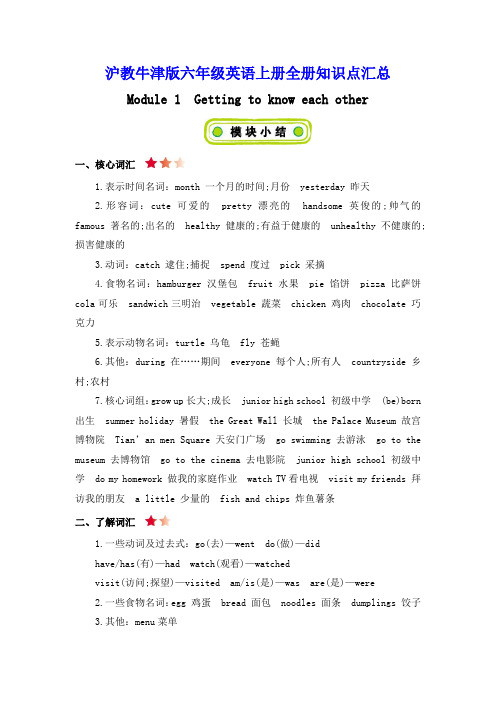
沪教牛津版六年级英语上册全册知识点汇总Module 1 Getting to know each other一、核心词汇1.表示时间名词:month 一个月的时间;月份yesterday 昨天2.形容词:cute 可爱的pretty 漂亮的handsome 英俊的;帅气的famous 著名的;出名的healthy 健康的;有益于健康的unhealthy 不健康的;损害健康的3.动词:catch 逮住;捕捉spend 度过pick 采摘4.食物名词:hamburger 汉堡包fruit 水果pie 馅饼pizza 比萨饼cola可乐sandwich三明治vegetable 蔬菜chicken 鸡肉chocolate 巧克力5.表示动物名词:turtle 乌龟fly 苍蝇6.其他:during 在……期间everyone 每个人;所有人countryside 乡村;农村7.核心词组:grow up长大;成长junior high school 初级中学(be)born 出生summer holiday 暑假the Great Wall 长城the Palace Museum 故宫博物院Tian’an men Square 天安门广场go swimming 去游泳go to the museum 去博物馆go to the cinema 去电影院junior high school 初级中学do my homework 做我的家庭作业watch TV看电视visit my friends 拜访我的朋友 a little 少量的fish and chips 炸鱼薯条二、了解词汇1.一些动词及过去式:go(去)—went do(做)—didhave/has(有)—had watch(观看)—watchedvisit(访问;探望)—visited am/is(是)—was are(是)—were2.一些食物名词:egg 鸡蛋bread 面包noodles 面条dumplings 饺子3.其他:menu菜单三、核心句型1.Her hair was short and her eyes were big. 她那时头发很短而且眼睛很大。
沪教牛津版六年级英语上册全册知识点点汇总

沪教牛津版六年级英语上册全册知识点汇总Module 1 Getting to know each other一、核心词汇1.表示时间名词:month 一个月的时间;月份yesterday 昨天2.形容词:cute 可爱的pretty 漂亮的handsome 英俊的;帅气的famous 著名的;出名的healthy 健康的;有益于健康的unhealthy 不健康的;损害健康的3.动词:catch 逮住;捕捉spend 度过pick 采摘4.食物名词:hamburger 汉堡包fruit 水果pie 馅饼pizza 比萨饼cola可乐sandwich三明治vegetable 蔬菜chicken 鸡肉chocolate 巧克力5.表示动物名词:turtle 乌龟fly 苍蝇6.其他:during 在……期间everyone 每个人;所有人countryside 乡村;农村7.核心词组:grow up长大;成长junior high school 初级中学(be)born 出生summer holiday 暑假the Great Wall 长城the Palace Museum 故宫博物院Tian’an men Square 天安门广场go swimming 去游泳go to the museum 去博物馆go to the cinema 去电影院junior high school 初级中学do my homework 做我的家庭作业watch TV看电视visit my friends 拜访我的朋友 a little 少量的fish and chips 炸鱼薯条二、了解词汇1.一些动词及过去式:go(去)—went do(做)—didhave/has(有)—had watch(观看)—watchedvisit(访问;探望)—visited am/is(是)—was are(是)—were2.一些食物名词:egg 鸡蛋bread 面包noodles 面条dumplings 饺子3.其他:menu菜单三、核心句型1.Her hair was short and her eyes were big. 她那时头发很短而且眼睛很大。
牛津英语上海版六年级下册知识点整理

牛津英语上海版六年级下册知识点整理Module1 City lifeUnit1 Great cities in Asian词组:the capital of... ...的首都 north-east东北 from...to...从...到...in the past在过去 the Great Wall长城 more than=over超过eat dumpling吃饺子 tall buildings高楼大厦huge department stores大型的百货商店 a lot of许多语法点:1.Beijing is north of Shanghai.北京在上海的北部。
(1)两地不相邻:A is north of B.(2)所属关系:A is in the north of B.(3)两地接壤:A is on the north of B.2.How far is it from Shanghai to Beijing?从北京到上海有多远?How far... 多远。
询问距离的远近,路程的长远。
3.How long does it take to travel from Shanghai to Beijing by train?坐火车从上海到北京要多久?(1)How long...多久。
询问时间长短。
How long…多长。
用于询物的问长度。
(2)by+交通工具,表示“乘...交通工具”,用How提问。
4.It takes about ten hours.大约需要十小时It takes (sb.) st. to do sth. 做某事需要花费多长时间。
5.They enjoy eating dumplings.他们喜欢吃饺子enjoy/like/love doing sth. 喜欢做某事6.Two and a half days=Two days and a half两天半Half an hour=one and a half hours=one/an hour and a half一个半小时Unit2 At the airport词组:plane ticket机票 silk scarf丝巾 a lot of/plenty of大量的,许多departure time出发时间 leave for出发去某地 have to不得不be going to将要 arrive at到达boarding card登机牌 name tap姓名语法点:1.Aunt Judy and Uncle Mike have lived in Los Angeles for six years.朱迪婶婶和迈克叔叔在洛杉矶已住了六年。
沪版牛津英语六年级上知识点整理

Module 1 Family and friendsUnit 1 Family and relatives1.family and relatives 家庭和亲戚2. a family tree 一个家谱3.grandsons and granddaughters 孙子和孙女们/外孙和外孙女们4.get a lot of presents 得到许多礼物5.Happy Birthday (to sb.) ! 生日快乐!6.get a birthday card from sb. 从某人那儿得到一张生日卡7.one of my family members 我的家庭成员之一8.only have one aunt 仅仅有一个阿姨9.my classmates 我的同班同学10.go shopping 去购物11.what else 其他什么12.play badminton 打羽毛球13.go cycling 去骑自行车14.go swimming 去游泳15.two cousins 两个堂/表兄弟/妹16.how many + 名词复数多少……语言点1. This is my grandfather.这是我的(外)祖父。
These are my family and relatives.这些是我的家人和亲戚。
注意句中各成分保持单复数同形。
2. I‟m their son.. 我是他们的儿子。
We‟re their sons.我们是他们的儿子。
3. How many uncles do you have?你有多少个叔叔?How many后面接可数名词的复数形式。
4. What do you do with your…?你和你的…干什么?5. What else do you do with your…?你和你的…还干什么?6. What else do you do with your…?你和你的…还干什么?With是个介词,后面接人称代词时,要用宾格的形式。
沪教牛津版六年级知识点归纳

六上Module 1-Getting to know each other教学目的:1.学会在详细语境中运用新单词。
2驾驭某些动词过去式的用法。
3.学会用过去时态表述状态。
4.学会用过去时态表述做的事。
5.驾驭写信的格式。
6.稳固情态动词 can、should用法。
重点词汇: ① mouth cute pretty handsome catch② famous during spend everyone countryside③ healthy unhealthy Hamburgyesterday sandwich vegetablechicken chocolate重点句型:1. I/He/She was...You/We/ They were...2.-How was your summer holiday?-It was/was not ...3.- What did you have for breakfast/ lunch/ dinneryesterday?- I had some...语音发音:e e-e ee ea i y e a eaP b t d k c ck gModule 2-Relationship教学目的:1.学会在详细语境中运用新单词。
2驾驭某些动词过去式的用法。
3.学会用一般过去时的疑问句。
4.稳固wh - questions 在过去语态中的用法。
5.驾驭数词 hundred,thousand的用法。
6.稳固 Would like to...句型和 There be ...句型。
重点词汇: ① neighbour son daughter noisy dig② thousand hundred wild way die learn send③ e-friend country other hobby重点句型:1. - Did you +动词原形+过去时间?- Yes,I did./ No,I didn’t.2.There was a...in the past.There were many...in the past.3.-Would you like to ...-Yes,I’d like to./No, I wouldn’t.语音发音 a ar u o ue u-e oo uf v thModule 3-Out and about教学目的:1.学会在详细语境中运用新单词。
牛津英语六年级(全年级)重点知识点,句型,单词,短语整理总结
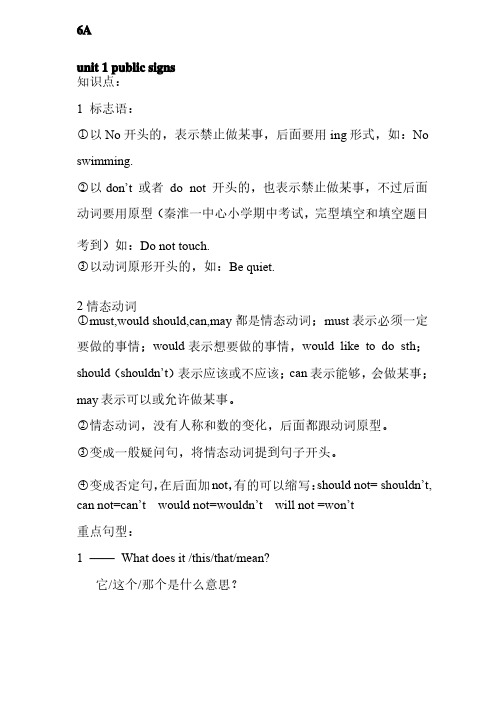
6Aunit 1 public signs知识点:知识点:1 标志语:标志语:○1以No 开头的,表示禁止做某事,后面要用ing 形式,如:No swimming.○2以don don’’t 或者或者do not 开头的,也表示禁止做某事,不过后面动词要用原型(秦淮一中心小学期中考试,完型填空和填空题目考到)如:Do not touch.○3以动词原形开头的,如:Be quiet. 2情态动词情态动词○1must,would should,can,may 都是情态动词;must 表示必须一定要做的事情;would 表示想要做的事情,would like to do sth ;should (shouldn shouldn’’t )表示应该或不应该;can 表示能够,会做某事;may 表示可以或允许做某事。
表示可以或允许做某事。
○2情态动词,没有人称和数的变化,后面都跟动词原型。
情态动词,没有人称和数的变化,后面都跟动词原型。
○3变成一般疑问句,将情态动词提到句子开头。
变成一般疑问句,将情态动词提到句子开头。
○4变成否定句,在后面加not ,有的可以缩写:should not= shouldn should not= shouldn’’t, can not=can can not=can’’t would not=wouldn would not=wouldn’’t will not =won will not =won’’t重点句型:重点句型:1 ————What does it /this/that/mean? 它/这个/那个是什么意思?那个是什么意思?It means you /wemust/should/shoudn It means you /wemust/should/shoudn’’t..意思是你/我们必须/应当/不应该。
解析:解析:当你不知道一个标志、一个词语或者一句话的意思时,可以用这句话来询问。
word完整版牛津沪教版英语六年级上重点知识复习及练习

牛津沪教版英语六年级上重点知识复习及练习六年级上重点知识复习及练习Part 1单词梳1spendv.度拓spend v.花b spend some time / some money (in) doing sthsb spend some time / some money on sthEg: Lucy spends five hours in doing her homework..注spend-spent-spent. cost花sth cost sb some money.某物花费了某人多少take花It takes sb some time to do sth做某事花了某人多久时2islandn.岛住在某岛live on.Eg: He lives on Chong Ming Island.3bayn.海近义harbour海4weekendn.周短语at weekends在周5seasiden.海拓side n.6luckyadj.幸运的,好运luckilyadv.反义unlucky; unluckily7.marketn.市supermarket超8. activityn.活activities(复active adj.活跃barbecuen.烧10.sandcastlen.沙11. collectv收collectionn.收集物(可数12. plan v.计短语plan to do sth.计划做某Eg: I plan to buy a new bag.13. shallmodal v.将要,好吗(主要对第一人称复数提问Eg: Shall we go out and play together?过去should14. cost花短语sth cost sb some money.某物花费了某人多少Eg: The book costs me ten dollars.15. trip n.旅短语a trip/ visit to some plac去某地旅8/ 1牛津沪教版英语六年级上重点知识复习及练习Part 2 短语整理一起在外度过一天 1. spend a day out together在绿岛2. on Green Island在快乐3. in Happy Town在龙4. in Dragon Bay在幸运岛5. on Lucky Island在周6. at weekends = at the weekend离开某地近7. be near sp.离开某地远8. be far (away) from sp海边9. Seaside Town一张我家人和我的照10. a photo of my family and me一起吃午11. have lunch together格林市12. Green Market在太阳13. In Sunny Town太空博物14. Space Museum在月亮15. In Moon Town一项活16. an activity进行一次烧17. have a barbecue放风18. fly kites骑自行19. ride bicycles筑沙20. make sandcastles收集贝21. collect shells制作一本照片22. make an album计划做某23. plan to do sth.一个好主24. a good idea哪一个地25. which place计划一次旅26. plan a trip……怎么样?(常用于表示建议或提议27. How abou打算做28. be going to + v.Part 3基础练一单项选-ups _________ this .( ) 1 . Let's do some pusD . withB . forC . like A . at) 2 . Boys are interested __________ ball games .(D . in playC . to played A . in playing B . at play) 3 . This room is ____________ .(D . Alice and Betty'C . Mary's and Joan' A . Tom's and Mik B . Alice and Lucy ) 4 . Why not __________ for a walk ?(D . goingB . go C . went A . to go) 5 . How _________ the little girl walks !(D . more quicklyC . quicker A . quick B . quickly) 6 . We hope _________ the game .(D . to winningB . wonC . to win A . winning) 7 . The accident happened _________ a cold winter evening .(D . inC . on B . at A . from8/ 2牛津沪教版英语六年级上重点知识复习及练习) 8 . Let's read the text , _____________ ?(D . do you C. will you A . do we B . shall we”in English ?( ) 9 . How can you ________ “在晚D . talkC . say A . speak B . tell ) 10 . Sports can keep us __________ .(D . healthyC . unhealthy A . health B . healthily用所给单词的适当形式填1. What would you like _________ (have) for your dinner tonight?2. You have enough time to do the work. You don't need _________ (finish) it nowyou a shirt for your birthday. What colour do you like bestbu3. Bill, let me _________4. Where will we go __________ (look) for the missing mobile phone?5. Tom asked me if I would go _________ (windsurf) with him.Let' s take the elevato.(four)6. Toys for Kids is on the______ floor.(shop)7. Most of the_____ _malls in Canada are near city centres,I' 11 wear the T - shirt with the long______. ( sleeve)8. It' 11 be very sunny tomorrow.(change) Can I try on the shirt in the______ room? Of course you can.9.改写句保持愿意不)1. How about taking a walk after dinner? take walk after dinner._________ __________保持愿意不)2. He wouldn't like to be a cook in the future. to be a cook in the future.He ___________ ______________)3. The book cost me 20 yuan. 划线部分提the book cost ?________ __________4. Kitty is a very friendly student. 感叹)Kitty is!________ ________)5. He is our Chinese teacher. 保持愿意不Chinese.He _________ _________改为否定)6. She helps me clean the house. clean the house.She ________ __________Part 4综合练Reading and comprehensionAThis is a question many students ask. In my opinion, the most effective way is to learnHow can I learn English well?nlessons by heart. If you can recite the text and write it out, you've learned it fairly well. And if you can tell, in your oy successful learner indeed. Your English will be quite perfect.words, what the lesson says you're a veyouThis is a difficult task. However, if you try to learn by heart only part of each lesson, you'll find it not half so hard asmight have thought.towayonouranecessary.writingisalsoIthelpsyoulotcourse,progress.makeyouthisLearningway,willrapidOf success in English.Equally important is to feel the language. You should be able to laugh at jokes and be shocked at bad news. When usingEnglish, try to forget your mother tongue. Instead of helping you, your own language gets in your way. So, never try to seeEnglish through translation.1.In the writer's opinion, the most effective way in learning English is ____A.to practise speaking, writing and feeling itB.to forget your own native languageC.to translate everything into his own languageD.to memorize the English words and grammatical rules8/ 3牛津沪教版英语六年级上重点知识复习及练习2. “Instead of helping you, your own language gets in your way.”This sentence means that memorizing your own languagecan ________.B.stop you mastering English A.help you to study English wellD.help you notice mistakesC.make English easy to learn3.Equally important is to feel the language. “to feel the language”here means________.A.to get a knowledge of English by touchingB.to be able to read and write EnglishC.to translate English into your own by imaginingD.to be able to experience the rich sensation of the languageBWhen we can see well, we do not think about our eyes often. It is only when we can not see perfectly that we come to seehow important our eyes are.People who are nearsighted can only see things that are very close to their eyes. Many people who do a lot of close work,such as writing and reading, become nearsighted. Then they have to wear glasses in order to see distant things clearly.People who are farsighted face just the opposite problem. They can see things that are far away, but they have difficultyget glasses too.reading a book unless they hold it at arm's length. If they want to do much reading, they musOther people do not see clearly because their eyes are not exactly the right shape. This, too, can be corrected by glasses.isSome people's eyes become cloudy because of cataracts. Long ago these people often became blind. Now, however, itpossible to operate on the cataracts and remove them.When night falls, colors become fainter to the eyes and finally disappear. After your eyes have grown used to the dark, youcan see better if you use the side of your eyes rather than the centers. Sometimes, after dark, you see a small thing to oneside of you, which seems to disappear if you turn your head in its direction. This is because when you turn your head, youat the thing too directly. Men on guard duty sometimes think they see something moving to one side of them.arelookinthismistaken.However,andtheybelievetheywerestraightatit,theycannotseeitanymore,Whentheytur ntolookmistake happens because the center of the eye, which is very sensitive in daylight, is not as sensitive as the sides of the eyeafter dark.4.We don't know that our eyes are of great importance until ________B. we cannot see clearlyA. we think about our eyesD. we have to do much readingC. we wear glasses5.According to the passage, a ________ is more likely to be nearsighted.D.painterC. guardA.tailorB. doctor6.People who are farsighted ________ .A.cannot do a lot of close work without glassesB.can only see things that are very close to their eyesC.have difficuly reading a book if they hold it at arm's lengtD.have the same problem as the nearsighted people7.To see a small thing at night, it is better to look ________ .B.with half shut or narrowed eyesA.with wide open eyesD.in a slightly different directionC.straight at itC Read and answer the questions.difference.noofbirthdays.庆)theirAmericanchildrenaretowordoverfromChildrenallthelikecelebrateAmerican children usually celebrate with a party. They invite their friends to join the party. The party may not be held on theexact date of birthday if it comes to a school day. It may be held on the closest weekend instead. Today two kinds of parties are the most popular. One is held at home. Parents make their house beautiful with balloonsand coloured paper. They prepare a special birthday meal. The children play games. The other one is held away from home.Some are at a special restaurant. The children eat pizza and ice cream. The waiters, who serve the food, also sing and telljokes to the children. Other parties may be held at a park, a movie theatre or some other places.8/ 4牛津沪教版英语六年级上重点知识复习及练习Every birthday party has a birthday cake with candles on it. There is one candle for each year of a birthday boy. or girl'sage. When the candles are lighted, everyone sings the special birthday song: HAPPY BIRTHDAY TO YOU.79. When will they hold their birthday party if the birthday comes to a school day?________________________________________________________80. Are there only two kinds of parties?________________________________________________________81. Are parents very busy when the party is held at home?________________________________________________________82. What do the waiters do to the children to celebrate their birthday?________________________________________________________83. Where may other parties beheld?________________________________________________________84. When you are twelve years old, how many candles do you need?________________________________________________________首字母填Dclasses. They can do things they want to do. Mary will go to the1It's Sunday today. The students have n hard.3to see a film with her friends. Tony and some other boys are going to play football. Eddiewc____2__on TV. They will b__6___to the library to read the books. John is going to watch a football m5He is g4 very happy..__________ 6. __________1. __________ 2. __________ 3. ___________ 4. ________四.练I用现在进行时改写句Tom can speak Chinese.1We have four lessons.23I watch TV everyday.She works in a hospital.4.):选择最恰当的答I. Choose the best answer Lucky Island?___________1.Where have you beenD. fromC. inA. atB. on.2.Look, this is a photo of____________D. I and youB. me and youA. you and IC. you and me__________ China. People usually go there by air.3.The USA isD. far away fromB. awayC. far awayA. farHave you ever been to Thailand?4.wice.Yes, I have. I have been _____________D. itC. thereA. to thereB. to it8/ 5牛津沪教版英语六年级上重点知识复习及练习___________ your father usually ____________ at weekends?_5. WhatD. will; do C. did; do A. do; do B. does; do. 6. Alice is a friend ofD.mineB. IC.myA. mepiano.7.Jack likes to playfootball. His sister, Mary, likes to playD./;/B. the;theC./;theA. the; /Shanghai.8.Here is a mapD. atC. forA. ofB. inin her spare time.9.My mother likesB.to go shopsA. go shoppingD. to going shoppingC. going shoppingseven o'clock.10. He arrived at the History MuseumD. onforB. inC.A. at11. We are going to visit the Bund _____________ .B. last SundayA. next SundayD. the SundayC. on SundaysHow can we get to the Space Museum?12.bus.Let's go ______________D. at aA. onB. byC. in afilm?13.I feel so bored. How about _____________D. seeingC. to seeingA. to seeB. see?14.What time will you come ____________D. backC. to homeA. thereB. to here____________ happily.15.Look, the studentsB. playA. are playingD.is playinC. played. Complete the sentences with the given words in their proper forms 用所给单词的适当形式完成句)of my family and me. (photo)1. These are somecenters in Shanghai. (shop)2. There are a lot of_______________ . (birth)3. Tomorrow will be my tenth4. This is a photo of Ben and_______________ father. (he)here. (friendly)5. He got some new______________True or False. 阅读短文,判断正It's Sunday today. It's five o'clock in the afternoon. Dick is going to the supermarket with his parents. His father is nowcleaning the car. He is going to drive his family to the supermarket. It is far away from their home. His mother is going tbuy a lot of food: bread, milk, fruit and drinks. She also wants to buy many other things for the next week. Dick wants tobuy a video game machine. His father says to him, 'OK, but you mustn't play video games all the time.After class you mustgo over your lessons and do your homework first.'They are going to have dinner there and come back at nine o'clock in the evening.They will enjoy themselves very much.Dick and his parents are going to do some shopping today.) 1(8/ 6牛津沪教版英语六年级上重点知识复习及练习They are going to the supermarket by bus. ( ) 2The supermarket is not far away from their home.( ) 3Dick's mother is going to buy a lot of food for the next week.) 4 (Dick is going to buy a video game machine but he can't play it all the time. ( ) 5They are going to stay in the supermarket for 5 hours.( ) 6.Choose the right answer. ⅤIt's Sunday. Mother, father and the children are going to the beach.Where are we going, Dad? Alice:Let's look at the map. Let me see. We will go to the East Point Beach. Father.We'll swim in the sea. Mother:Are we going to have a picnic? David:Alice: Yes, of course.David: That's nice.Father: Come on! Let's all get in the car!怎么了), Dad? Alice: What's wrong ( )! 发动Father: The car can't start ( Mother: So we will all stay at home.Let's have a picnic in the garden! Alice:Great!David:.)1 The family is going to ____________ (C. swim and have a picnicB. have a picnicA. swim in the sea___________ ._ ( )2 They are going thereC. by underground B. by carA. by bus______________ .)3 They won't go to the beach (because it is rainy A.because Father is not fine B.because the car doesn't startC.They will have the picnic _____________ in the end.( ) 4A. on the beachin the garden B.in the car C.Ⅵ.Read the passage and fill in the blanks with proper words.It will be grandfather's s______________ birthday next Sunday. We are going to have a big birthday p____________.c______________for a to I him. some will and Uncles aunts buy p______________for But want make nice birthdaygrandfather. Mum and Dad are going to buy a lot of food from the s______________.】【Keys 1. Tom is speaking Chinese. I.8/ 7牛津沪教版英语六年级上重点知识复习及练习2. We are having four lessons.3. I am watching TV now.4. She is working in a hospital.5. Are you reading this book?6. Kitty and Ben are having lunch at about twelve.7. His father is helping them.8. They are watching TV in the evening.11-15 ABDD6-1DCACAII. 1-BCDCB5. friends4. his. 1. photos2. shopping3. birthday. TFFTTF. CBCB. sixtieth/ seventieth, party, presents, cake, supermarket.8/ 8。
牛津英语上海版六年级下册知识点整理

牛津英语上海版六年级下册知识点整理Module1 City lifeUnit1 Great cities in Asian词组:the capital of... ...的首都 north-east东北 from...to...从...到...in the past在过去 the Great Wall长城 more than=over超过eat dumpling吃饺子 tall buildings高楼大厦huge department stores大型的百货商店 a lot of许多语法点:1.Beijing is north of Shanghai.北京在上海的北部。
(1)两地不相邻:A is north of B.(2)所属关系:A is in the north of B.(3)两地接壤:A is on the north of B.2.How far is it from Shanghai to Beijing?从北京到上海有多远?How far... 多远。
询问距离的远近,路程的长远。
3.How long does it take to travel from Shanghai to Beijing by train?坐火车从上海到北京要多久?(1)How long...多久。
询问时间长短。
How long…多长。
用于询物的问长度。
(2)by+交通工具,表示“乘...交通工具”,用How提问。
4.It takes about ten hours.大约需要十小时It takes (sb.) st. to do sth. 做某事需要花费多长时间。
5.They enjoy eating dumplings.他们喜欢吃饺子enjoy/like/love doing sth. 喜欢做某事6.Two and a half days=Two days and a half两天半Half an hour=one and a half hours=one/an hour and a half一个半小时Unit2 At the airport词组:plane ticket机票 silk scarf丝巾 a lot of/plenty of大量的,许多departure time出发时间 leave for出发去某地 have to不得不be going to将要 arrive at到达boarding card登机牌 name tap姓名语法点:1.Aunt Judy and Uncle Mike have lived in Los Angeles for six years.朱迪婶婶和迈克叔叔在洛杉矶已住了六年。
(word完整版)牛津沪教版英语六年级上重点知识复习及练习
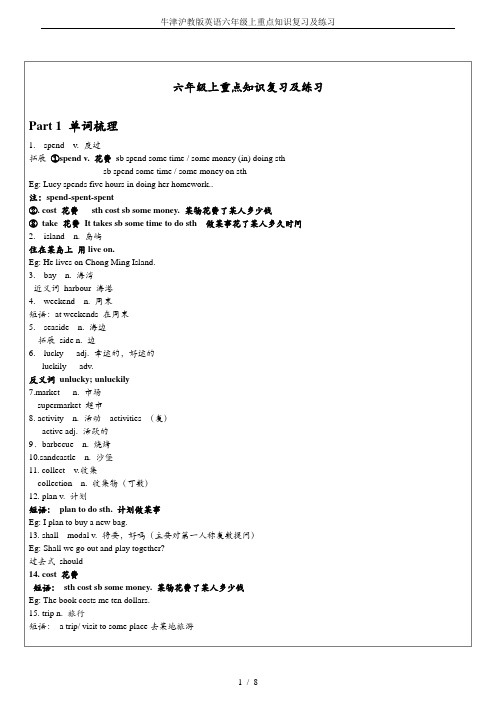
2. “Instead of helping you, your own language gets in your way.”This sentence means that memorizing your own language can ________.A.help you to study English wellB.stop you mastering EnglishC.make English easy to learnD.help you notice mistakes3.Equally important is to feel the language. “to feel the language” here means________.A.to get a knowledge of English by touchingB.to be able to read and write EnglishC.to translate English into your own by imaginingD.to be able to experience the rich sensation of the languageBWhen we can see well, we do not think about our eyes often. It is only when we can not see perfectly that we come to see how important our eyes are.People who are nearsighted can only see things that are very close to their eyes. Many people who do a lot of close work, such as writing and reading, become nearsighted. Then they have to wear glasses in order to see distant things clearly. People who are farsighted face just the opposite problem. They can see things that are far away, but they have difficulty reading a book unless they hold it at arm’s length. If they want to do much reading, they must get glasses too.Other people do not see clearly because their eyes are not exactly the right shape. This, too, can be corrected by glasses. Some people’s eyes become cloudy because of cataracts. Long ago these people often became blind. Now, however, it is possible to operate on the cataracts and remove them.When night falls, colors become fainter to the eyes and finally disappear. After your eyes have grown used to the dark, you can see better if you use the side of your eyes rather than the centers. Sometimes, after dark, you see a small thing to one side of you, which seems to disappear if you turn your head in its direction. This is because when you turn your head, you are looking at the thing too directly. Men on guard duty sometimes think they see something moving to one side of them. When they turn to look straight at it, they can not see it any more, and they believe they were mistaken. However, this mistake happens because the center of the eye, which is very sensitive in daylight, is not as sensitive as the sides of the eye after dark.4.We don’t know that our eyes are of great importance until ________.A. we think about our eyesB. we cannot see clearlyC. we wear glassesD. we have to do much reading5.According to the passage, a ________ is more likely to be nearsighted.A.tailorB. doctorC. guardD.painter6.People who are farsighted ________ .A.cannot do a lot of close work without glassesB.can only see things that are very close to their eyesC.have difficult y reading a book if they hold it at arm’s lengthD.have the same problem as the nearsighted people7.To see a small thing at night, it is better to look ________ .A.with wide open eyesB.with half shut or narrowed eyesC.straight at itD.in a slightly different directionC Read and answer the questions.Children from all over the word like to celebrate (庆祝) their birthdays. American children are of no difference. American children usually celebrate with a party. They invite their friends to join the party. The party may not be held on the exact date of birthday if it comes to a school day. It may be held on the closest weekend instead.Today two kinds of parties are the most popular. One is held at home. Parents make their house beautiful with balloons and coloured paper. They prepare a special birthday meal. The children play games. The other one is held away from home. Some are at a special restaurant. The children eat pizza and ice cream. The waiters, who serve the food, also sing and tell jokes to the children. Other parties may be held at a park, a movie theatre or some other places.( ) 2 They are going to the supermarket by bus.( ) 3 The supermarket is not far away from their home.( ) 4 Dick's mother is going to buy a lot of food for the next week.( ) 5 Dick is going to buy a video game machine but he can't play it all the time.( ) 6 They are going to stay in the supermarket for 5 hours.Ⅴ.Choose the right answer.It's Sunday. Mother, father and the children are going to the beach.Alice: Where are we going, Dad?Father. Let's look at the map. Let me see. We will go to the East Point Beach.Mother: We'll swim in the sea.David: Are we going to have a picnic?Alice: Yes, of course.David: That's nice.Father: Come on! Let's all get in the car!Alice: What's wrong (怎么了), Dad?Father: The car can't start (发动)!Mother: So we will all stay at home.Alice: Let's have a picnic in the garden!David: Great!( )1 The family is going to ____________ .A. swim in the seaB. have a picnicC. swim and have a picnic( )2 They are going there ____________ .A. by busB. by carC. by underground( )3 They won't go to the beach ______________ .A. because it is rainyB. because Father is not fineC. because the car doesn't start( ) 4 They will have the picnic _____________ in the end.A. on the beachB. in the gardenC. in the carⅥ.Read the passage and fill in the blanks with proper words.It will be grandfather's s______________ birthday next Sunday. We are going to have a big birthday p____________. Uncles and aunts will buy some p______________for him. But I want to make a nice birthday c______________for grandfather. Mum and Dad are going to buy a lot of food from the s______________.【Keys】I. 1. Tom is speaking Chinese.。
沪版牛津英语六年级上知识点归纳总结
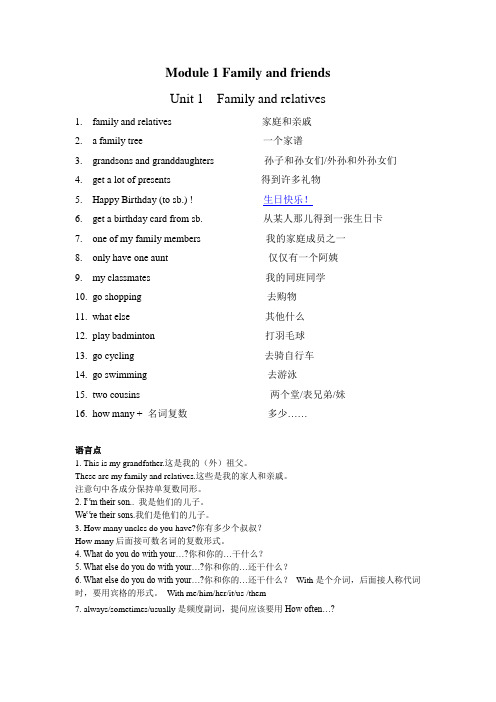
Module 1 Family and friendsUnit 1 Family and relatives1.family and relatives 家庭和亲戚2. a family tree 一个家谱3.grandsons and granddaughters 孙子和孙女们/外孙和外孙女们4.get a lot of presents 得到许多礼物5.Happy Birthday (to sb.) ! 生日快乐!6.get a birthday card from sb. 从某人那儿得到一张生日卡7.one of my family members 我的家庭成员之一8.only have one aunt 仅仅有一个阿姨9.my classmates 我的同班同学10.go shopping 去购物11.what else 其他什么12.play badminton 打羽毛球13.go cycling 去骑自行车14.go swimming 去游泳15.two cousins 两个堂/表兄弟/妹16.how many + 名词复数多少……语言点1. This is my grandfather.这是我的(外)祖父。
These are my family and relatives.这些是我的家人和亲戚。
注意句中各成分保持单复数同形。
2. I‟m their son.. 我是他们的儿子。
We‟re their sons.我们是他们的儿子。
3. How many uncles do you have?你有多少个叔叔?How many后面接可数名词的复数形式。
4. What do you do with your…?你和你的…干什么?5. What else do you do with your…?你和你的…还干什么?6. What else do you do with your…?你和你的…还干什么?With是个介词,后面接人称代词时,要用宾格的形式。
沪版牛津英语六年级上知识点整理
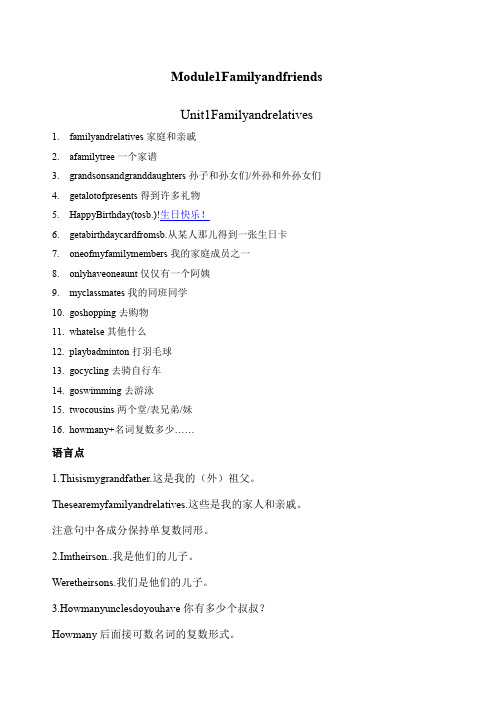
Module1FamilyandfriendsUnit1Familyandrelatives1.familyandrelatives家庭和亲戚2.afamilytree一个家谱3.grandsonsandgranddaughters孙子和孙女们/外孙和外孙女们4.getalotofpresents得到许多礼物5.HappyBirthday(tosb.)!生日快乐!6.getabirthdaycardfromsb.从某人那儿得到一张生日卡7.oneofmyfamilymembers我的家庭成员之一8.onlyhaveoneaunt仅仅有一个阿姨9.myclassmates我的同班同学10.goshopping去购物11.whatelse其他什么12.playbadminton打羽毛球13.gocycling去骑自行车14.goswimming去游泳15.twocousins两个堂/表兄弟/妹16.howmany+名词复数多少……语言点1.Thisismygrandfather.这是我的(外)祖父。
Thesearemyfamilyandrelatives.这些是我的家人和亲戚。
注意句中各成分保持单复数同形。
2.Imtheirson..我是他们的儿子。
Weretheirsons.我们是他们的儿子。
3.Howmanyunclesdoyouhave你有多少个叔叔?Howmany后面接可数名词的复数形式。
4.Whatdoyoudowithyour…你和你的…干什么?5.Whatelsedoyoudowithyour…你和你的…还干什么?6.Whatelsedoyoudowithyour…你和你的…还干什么?With是个介词,后面接人称代词时,要用宾格的形式。
Withme/him/her/it/us/them7.always/sometimes/usually是频度副词,提问应该要用Howoften…Unit2Ihaveagoodfriend1.helpeachother互相帮助2.helpotherpeople=helpothers帮助别人3.not…atall根本不4.gooutatnight在晚上出去5.liketobetogether喜欢在一起6.walktoschooltogether一起走去学校7.befriendly友好的8.behelpful有帮助的9.workhard=studyhard努力学习10.belateforschool上学迟到11.getangry变得生气12.bekindtoothers对别人友善的13.sharesth.withsb.和某人分享某物14.benevernaughty从不淘气15.nevertellalie/lies从不说谎16.avisittosp.一次去某地的参观17.liveintheUSA=liveinAmerica居住在美国18.visitsp.forthefirsttime第一次参观某地19.asksb.aboutsth.询问某人关于某事20.have/hasbeentosp.曾去过某地21.OceanPark海洋公园22.GardenCityZoo花园城市公园23.WaterWorld水上世界24.FriendsoftheEarth地球的朋友25.lookafter=takecareof照顾,照看26.lookaftertheenvironment照顾环境27.allthethingsroundus我们周围所有的东西28.pollutetheair污染空气29.airpollution空气污染30.waterpollution水污染ndpollution陆地污染32.keepsth.clean保持某物干净33.pickup捡起,拾起34.putrubbishintorubbishbins把垃圾放入垃圾箱35.tellsb.todosth.告诉某人做某事36.tellsb.nottodosth.告诉某人不要做某事37.leaverubbish留下垃圾38.wanttobe/become想要成为39.wanttodosth.想要做某事40.promisetodosth.承诺做某事41.promisenottodosth.承诺不要做某事42.ourpromises我们的承诺43.discusssth.withsb.和某人讨论某事44.reuseshoppingbags再使用购物袋45.Whata bout/Howaboutsth./doing………怎么样?语言点:1.always/sometimes/usually/never是频度副词.在句中的位置是:放在行为动词的前面,放在be动词的后面。
沪版牛津英语六年级(上)知识点提要

知识点提要:一、语音容易读错的生词音标(想不起来的话,课后音标一一对照)granddaughter almost friendly naughty promise reuse discuss island dragon market museum activity secretary bank clerk choir * parent project invitation club___________________________________________________________housing estate exitprawn * wingsour * enough pyramid yogurt exercise than suggestion porridge *二、词汇与词组1.容易错的单词拼写➢an aunt / an uncle 首字母发音都是元音,所以前面跟的不定冠词用“an”,同理,an hour ago (h不发音,所以用an).➢注意比较:an umbrella vs. a useful book 虽然都是字母U开头,但是因为u的发音不同,所以前面跟的冠词就不一样。
另外,需要特别注意interesting / exciting 这样的元音开头的形容词,它们放在某个单数名词前面做修饰,这时也要用冠词an;但如果在它们前面又加了程度副词v ery / more…则冠词又必须变回a。
比如:a book vs. an interesting book vs. a very interesting book➢the Earth (大写E,且前面必须使用定冠词the, 表示独一无二的事物) ➢Friends of the Earth 表示一个环保组织(属于专有名词),F / E大写。
牛津课本上是把他们看成该组织的所有成员(相当于people),动词用复数;不过,某些习题书上也会把它看成一个组织,动词用单数。
上海牛津版英语六年级第一学期6A期末复习知识点总结1

must not
必须、很重要或必要不准,不允许或禁止
Wemust study hard.
You mustn’t leave school alone.
提问
把情态动词单独提前
Must we wait foryou?Yes,youmust ; No,youneedn’t.(非mustn’t)
花钱花时间
.spen.tw.yua.o.thi.pen...spen.tw.yua.i.buyin.thi.pen.
I spend two yuan on this pen.=I spend two yuan in buying this pen.
表示提议的句型
Shall we
Shall是情态动词+接动词原形
a little
只能修饰不可数名词,a little milk.
some
a lot of plenty of
既可修饰可数名词又可修饰不可数名词。当及可数名词连用时,只能及可数名词的复数形式连用
k. Plent.o.eggs.
someeggs. a lot of milk. Plenty of eggs.
the one on the left/right , the one in the middle =the left/right/middle one.
地点、方位表述
near离**近
far(away)from离**(很)远
直接接地点
.liv.nea.school. H.live.fa.awa.fro.school.
六年级英语(上)知识点
频度副词
频度副词
always、sometimes、usually、never
上海版牛津英语六年级全重点知识点复习整理[资料]-9页文档资料
![上海版牛津英语六年级全重点知识点复习整理[资料]-9页文档资料](https://img.taocdn.com/s3/m/9e929fbe680203d8ce2f24a9.png)
上海牛津英语六年级上下册全知识点梳理频度副词always/sometimes/usually/never 是频度副词,提问应该要用How often…?在句中的位置是:放在行为动词的前面,放在be动词的后面。
也可以说“行前系后”。
E.g She is always kind.她总是很善良的。
She always helps other people.她总是帮助其他人。
不能出现这样的句子:She is always helps other people.(×)一句话中不能同时出现两个动词。
并且要注意主谓保持一致,尤其注意第三人称单数不可以忽略。
how often 与how many timeshow often 提问“频率次数+时间范围”how many times 提问“频率次数”e.g. —How often do you exercise? —Twice a week.—How many times have you been there? —Twice.副词表示动作特征或性状特征。
一般用来形容或修饰除了名词和代词以外的词,主要修饰形容词、动词、其他副词和句子。
He looks very happy.(修饰形容词)The old lady is walking slowly now.(修饰动词)Luckily, he got the first prize.(修饰句子)形容词后面+ly构成副词:slow—slowly slight—slightly quick—quickly careful—carefully fierce—fiercely immediate—immediately gentle—gently lucky—luckily happy—happily介词What else do you do with your…?你和你的…还干什么?With是个介词,后面接人称代词时,要用宾格的形式。
最新上海牛津版英语六年级第一学期6A期末复习知识点总结
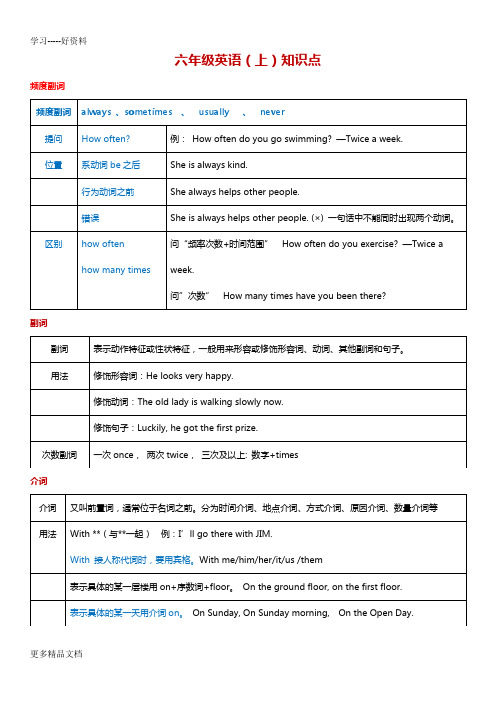
副词
表示动作特征或性状特征,一般用来形容或修饰形容词、动词、其他副词和句子。
用法
修饰形容词:He looks very happy.
修饰动词:The old lady is walking slowly now.
修饰句子:Luckily, he got the first prize.
次数副词
一次once, 两次twice, 三次及以上: 数字+times
someeggs. a lot of milk. Plenty of eggs.
我们熟练的掌握计算机应用,我们可以在网上搜索一些流行因素,还可以把自己小店里的商品拿到网上去卖,为我们小店提供了多种经营方式。Some
any
some用在肯定句中,any用于否定和疑问句中。
I have some new books. Do you have any new books? I don’t have any new books.
too many
too much
too few too little
too many +可数名词复数Too many sweets are bad for your teeth.
AB两地不相邻
A is north B.Beijing is north Nanjing.
9、如果你亲戚朋友送你一件DIY手工艺制品你是否会喜欢?AB两地接壤
可见“体验化消费” 广受大学生的欢迎、喜欢,这是我们创业项目是否成功的关键,必须引起足够的注意。A is on thenorth of B.Heilongjiang is on thenorth ofJilin..
在球类运动前不加定冠词
watching television
牛津上海版 六年级第一学期英语考点汇总
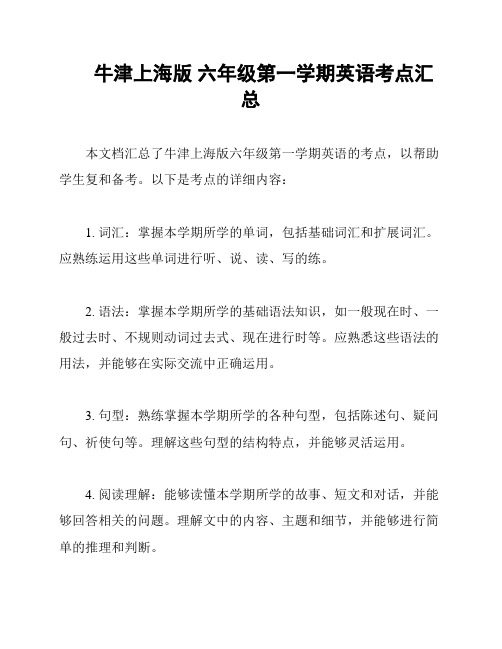
牛津上海版六年级第一学期英语考点汇
总
本文档汇总了牛津上海版六年级第一学期英语的考点,以帮助学生复和备考。
以下是考点的详细内容:
1. 词汇:掌握本学期所学的单词,包括基础词汇和扩展词汇。
应熟练运用这些单词进行听、说、读、写的练。
2. 语法:掌握本学期所学的基础语法知识,如一般现在时、一般过去时、不规则动词过去式、现在进行时等。
应熟悉这些语法的用法,并能够在实际交流中正确运用。
3. 句型:熟练掌握本学期所学的各种句型,包括陈述句、疑问句、祈使句等。
理解这些句型的结构特点,并能够灵活运用。
4. 阅读理解:能够读懂本学期所学的故事、短文和对话,并能够回答相关的问题。
理解文中的内容、主题和细节,并能够进行简单的推理和判断。
5. 听力理解:能够听懂本学期所学的对话、问答和短文,并能
够回答相关的问题。
理解听力材料中的信息、关键词和上下文,并
能够从中获取必要的信息。
6. 书写能力:书写要规范、清晰、工整。
应注意字母的大小写、大小比例和书写流畅度。
能够正确书写所学的单词、短语和句子。
7. 口语表达:能够运用所学的句型和词汇进行口语交流。
应注
意语音语调的准确性和自然流利度。
能够表达自己的观点、描述事
物和表达意愿。
希望通过对以上考点的复和总结,学生们能够在英语考试中取
得好成绩。
祝大家好运!
(Word count: 195)。
- 1、下载文档前请自行甄别文档内容的完整性,平台不提供额外的编辑、内容补充、找答案等附加服务。
- 2、"仅部分预览"的文档,不可在线预览部分如存在完整性等问题,可反馈申请退款(可完整预览的文档不适用该条件!)。
- 3、如文档侵犯您的权益,请联系客服反馈,我们会尽快为您处理(人工客服工作时间:9:00-18:30)。
上海牛津英语六年级上下册全知识点梳理频度副词always/sometimes/usually/never 是频度副词,提问应该要用How often…?在句中的位置是:放在行为动词的前面,放在be动词的后面。
也可以说“行前系后”。
E.g She is always kind.她总是很善良的。
She always helps other people.她总是帮助其他人。
不能出现这样的句子:She is always helps other people.(×)一句话中不能同时出现两个动词。
并且要注意主谓保持一致,尤其注意第三人称单数不可以忽略。
how often 与how many timeshow often 提问“频率次数+时间范围”how many times 提问“频率次数”e.g. —How often do you exercise? —Twice a week.—How many times have you been there? —Twice.副词表示动作特征或性状特征。
一般用来形容或修饰除了名词和代词以外的词,主要修饰形容词、动词、其他副词和句子。
He looks very happy.(修饰形容词)The old lady is walking slowly now.(修饰动词)Luckily, he got the first prize.(修饰句子)形容词后面+ly构成副词:slow—slowly slight—slightly quick—quickly careful—carefully fierce—fiercely immediate—immediately gentle—gently lucky—luckily happy—happily介词What else do you do with your…?你和你的…还干什么?With是个介词,后面接人称代词时,要用宾格的形式。
With me/him/her/it/us /them 在具体的某一楼层只能用介词on,并且第几层还要用序数词 On the ground floor, on the first floor, on the fifteenth floor具体的某一天介词只能用onOn Sunday, On Sunday morning,On the Open Dayhe one on the left/right 左边/右边的这个 the one in the middle 中间的这个如果是介词短语修饰the one,应该要放在the one后面,如果是形容词应放the one的中间the left/right one the middle oneat weekends= at the weekend在周末现在完成时现在完成时的构成是: have/has +动词的过去分词。
have/has been to 去过,到过(表示现在已经回来)have/has been in 住在= have lived / stayed inhave/has gone to 去,到….. (表示现在还没有回来)e.g. We have already been to Changfeng Park.I have lived in Shanghai for thirteen years.Have you been to …..yet? 你去过…..吗?Yes, I have already/just been to…./been there. 是的,我已经去过了。
No, I haven‟t been to …/been there yet. 不,还没有去过。
already 已经(多用于肯定句,放于动词前)yet 迄今,还(多用于疑问句和否定句,放于句末)just 刚刚(用法和位置和already相同)e.g. I have already been to Lily’s home.Have you been to Lily’s home yet?No, I haven’t been to her home yet.live / stay …for…在…住/待…(时间)for +一段时间,多与现在完成时连用表示动作从过去延续到现在的一段时间,并用how long提问。
代词one 用来指代一个人或事物,而ones用来指代一些人或事物。
定冠词the定冠词the的用法:a. 在球类运动前不加定冠词the play football / basketball / tennis, etc.b. 在乐器前必须加定冠词the play the piano / violin, etc.c. 在watching television中,不加定冠词the时间表达方式on the tenth of September / on September tenth 9月10日two fifteen = a quarter past two 2:15Three ten = ten past three 3:10One thirty = half past one 1:30two forty = twenty to three 2:40half an hour = 30 minutes 用了half an hour后面就不能再有minutesone and a half hours=one hour and a half 一个半小时One hour and twenty minutes 一小时二十分钟a.m./p.m.分别表示上午和下午。
First,…/Next,…/Then…/After that,…/Finally,…Finally = at last = in the end时间状语从句…when…当...的时候引导时间状语从句,表示一个动作与另一个动作同一时间发生,或一个动作在另一个动作所延续的范围之内发生。
主从句时态要一致。
当主句用一般将来时,从句用一般现在时代替将来时。
What can you see when there is a typhoon? 当有台风时,你能看见什么?When it doesn’t rain tomorrow, I will go out for a walk. 当明天天气不下雨时,我将出去散步。
交通工具By bus/bike/car/underground/train/ferryridetake a bus/bike/car/underground/train/ferryHe goes to school by bus.=He takes a bus to school.He goes to school by bike.=He rides his/a bike to school.=He cycles to school.其他的交通工具都能用take来表示乘,但bike只能用ride a bikeon foot 步行 She goes to work on foot every day.=She walks to work every day.数词、量词a few 只能修饰可数名词,与可数名词的复数形式连用 a little 只能修饰不可数名词some / a lot of 既可修饰可数名词又可以修饰不可数名词。
当与可数名词连用时,只能与可数名词的复数形式连用Some用在肯定句中,any用于否定和疑问句中。
plenty of “许多,大量”,后面可跟不可数名词或可数名词复数too much 太多+不可数名词too many 太多+可数名词复数e.g. Don’t drink too much cola. 不要喝太多的可乐。
Too many sweets are bad for your teeth. 吃太多糖对你的牙齿不好。
too little 太少+不可数名词too few 太少+可数名词复数可以用not...enough (修饰可数或不可数名词)结构改写句子。
e.g. You eat too little fruit. = You don’t eat enough fruit.less 更少+不可数名词(less是little的比较级)fewer 更少+可数名词(fewer是few的比较级)more 更多+可数名词、不可数名词(more是many、much共同的比较级)e.g. You should have less meat, fewer soft drinks and do more exercise. 你应该少吃肉,少喝软饮料,多做运动。
once 一次twice 两次三次及以上: 数字+timesa quarter of 四分之一three quarters of 四分之三量词:a slice of /slices of; a tin of/ tins of; a bag of/ bags of; a piece of/ pieces of问句How many uncles do you have?你有多少个叔叔?How many后面接可数名词的复数形式。
Why do you like…?你为什么喜欢……? I like…because…我喜欢……是因为……Which place shall we visit?我们将参加哪个地方?When are we going to come back?我们将什么时候回来?What kind of soup/fruit would you like?你想要哪种汤/水果?What does this sign mean?这个标志意味着什么?What does this sign mean?=what is the meaning of this sign?Where can we find it?我们在哪里能找到它?Which door must we use?我们必须要使用哪一扇门?Would you like rice or noodles for dinner tonight?你晚饭是想吃饭还是吃面条?or在这里是标示一种选择关系。
A:May I have some…,please?B: Ok. Here you are./Sorry. I haven‟t got any. May I…?用于提出请求。
回答时,表示允许,常用Ok。
/Sure./All right./Yes, you may.表示拒绝时,常用No, you may not./ I‟m afraid you can‟t. 并且may not不能用缩写的形式。
